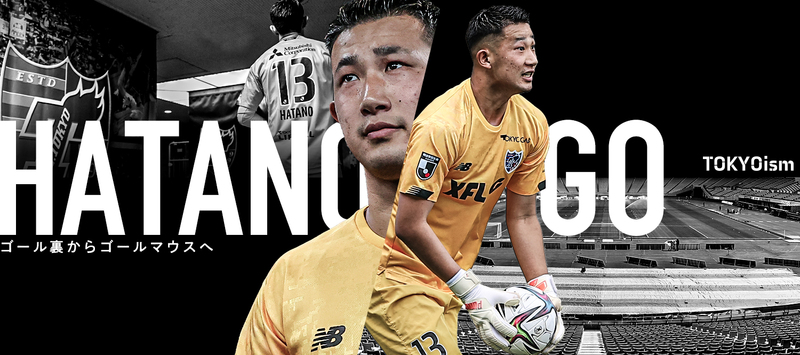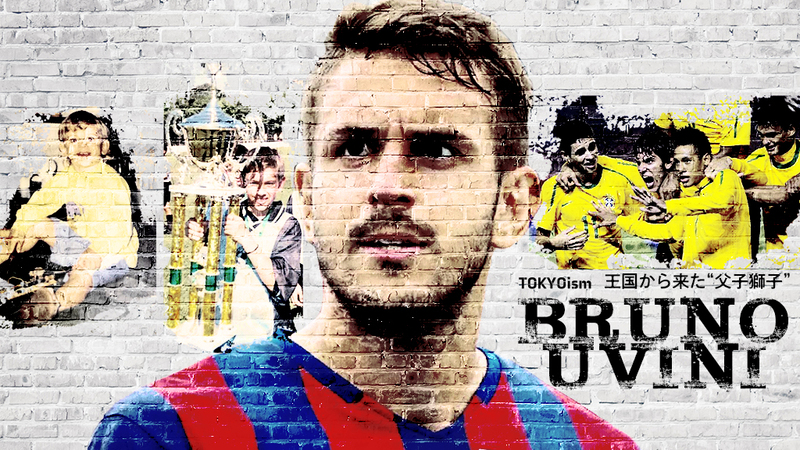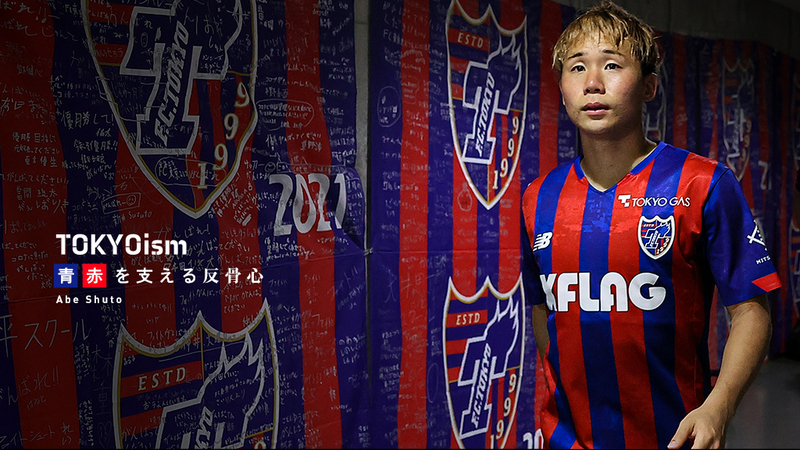This will be before the COVID-19 pandemic.
The media had access to the first-floor space of the Kodaira Grand clubhouse as a waiting room, but this was a corridor connecting the entrance, the pitch entrance, and the stairs to the second floor, where FC Tokyo U-18 players also showed up every day. By the time the reporters finished their usual work covering the top team, the high school students participating in the evening practice would arrive.
It has already been 7 years since the high school freshman Go HATANO popped his head out from the sliding door on the court side. I vaguely remember him saying, "I'm still growing," about his well-built physique. I also think the "joke" that he resembles Sota HIRAYAMA was already being mentioned. He was recognized as an extraordinary presence. There was a vivid impression.
The confidence of those around him that this child would surely become a professional was not betrayed, and he was promoted to the top team, inheriting the number 13 jersey from Mr. Hirayama, although his position is different. He has now become a presence guarding the goal for Tokyo as the starting goalkeeper.
At first glance, it seems to be going smoothly.
However, his journey as a goalkeeper began surprisingly late, when he was in the fourth grade of elementary school.
Transition from FW to GK, 4th grade
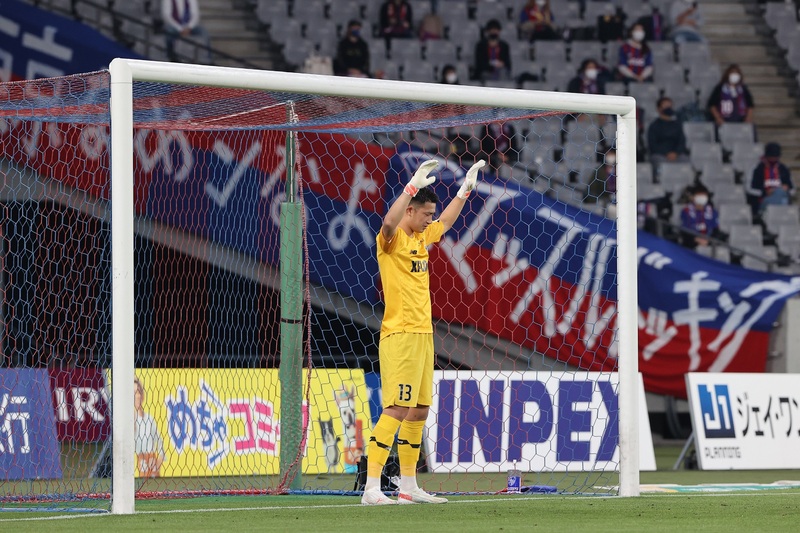
Coach Taketada Akiyama, who was in charge of the FC Tokyo Soccer School and the Advanced Class of the school, explained the background of the 'convert' for the U-15 Musashi team.
"It was around the time when it was said that goalkeepers also needed technical skills at their feet. However, there are some uncertainties when it comes to children who are specialists from the beginning. In that regard, he plays as a forward at his local club (Musashimurayama 1FC) and fulfills the elements of a field player. So, intentionally handing him the gloves, he gradually guided him to become a goalkeeper while doing both forward and goalkeeper without any discomfort."
At the elementary school level, he was about 180cm tall. It must be genetic; he was outstanding as a material. Even coaches from other clubs would ask, "Aren't you going to be a goalkeeper?"
"Bright and cheerful in a good way. She was an energetic child." (Coach Akiyama)
He is known as a mischievous character who raises his voice loudly even in the top team, which seems to be a testament to the fact that he has not lost the innocence of his elementary school days.
Coach Akiyama viewed that positively as an expression of human potential.
"Depending on the coach, they might think it's difficult. There may have been aspects that were restless or hard to teach. But in terms of personality, Mako had so much energy that it was commendable, and when he got angry, he would quickly become subdued. We viewed him as a childlike child."
Makoto OKAZAKI is the one who played with Go HATANO during his time at FC Tokyo U-18. His position is center back. Although he frequently issued instructions, he is not good at raising his voice to motivate the team. Go was doing that for him - and he expressed his gratitude for it.
Okazaki reflects on his high school days.
"Go had stability. It helps when the players behind him are so vocal and enthusiastic. The U-18 team becoming a good team is largely due to his character. Trust comes from that. I believe it's a strength."
Akihiro HAYASHI, whose return is imminent, is also highly regarded in that respect.
"In my ideal image, the goalkeeper must have a voice. I believe one of the goalkeeper's missions is to positively encourage the team with their voice. Communication is one of the important elements for a goalkeeper."
In today's world where there are many quiet children, a personality like Go HATANO's is becoming rare. While it stands out by Japanese standards, Coach Akiyama from Brazil positively acknowledges this, saying, "My strike zone for children is incredibly wide, so I want to do something for every child."
"Children have various ways of expressing their energy. It is our job to understand that and watch them as they grow into adults. Go was completely fine. Serious coaches might find discipline challenging, but there is a stage of growth. When I spoke with him recently after a long time, I realized he had grown up, and it reaffirmed my belief that players will definitely grow."
If you can accurately control the abundant energy, it is not impossible to lead to greatness. The warm gaze of those around nurtured 'Go' into a magnificent goalkeeper.
Go HATANO reflects on his elementary school days, which marked the beginning of his life as a goalkeeper.
"My mother put a lot of effort into me. What I was always told was, 'You never know who is watching you and where.' I was told to always play as if it were a selection, whether at the FC Tokyo school or in local club matches. Coach Akiyama would tell me before practices and games, 'Give it your all.' I believed those words and worked hard during my elementary school days."
In practice matches, if there are adult coaches from the opposing team, we tend to lose. By seriously facing the challenge of not wanting to lose, we have honed our skills. The desire to become better than these coaches and defeat them grows so strong that it sometimes leads to outbursts, and on the way home, my mother's scolding awaited me.
"I tend to have a bad mouth. My mother was really angry at me in the car on the way back. The fact that I've come this far is largely thanks to my mother. I've grown strong."
A strong-willed mother, a mischievous young boy, and gentle coaches watching over them. This circle of the developmental age was preparing for the tough competition of the youth age that would come later.
J1 Debut in the 4th Year of Professional Career
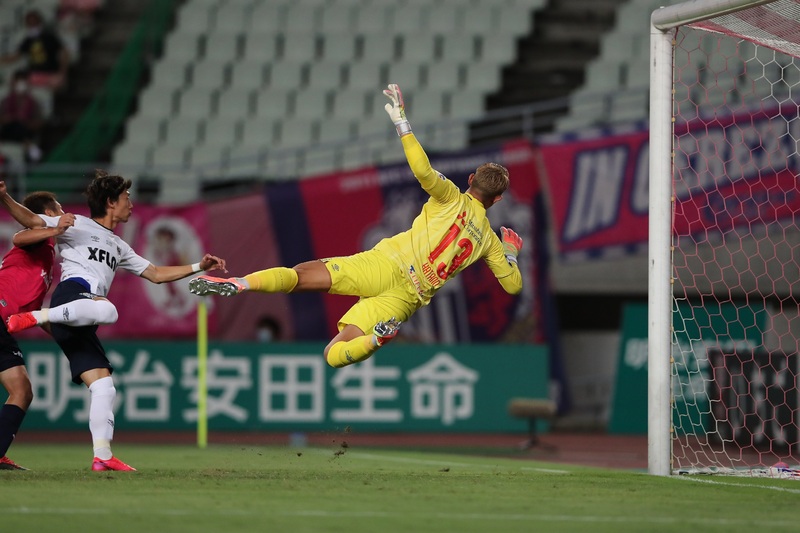
After becoming a junior high school student, Go HATANO progressed to FC Tokyo U-15 Musashi, where he further developed his foundation as a goalkeeper under the guidance of Kazuyoshi KARASHIMA, the U-15 Musashi GK coach.
Although he was physically large in elementary school, he was not yet able to move smoothly. Due to his habits as a field player, he lacked awareness in catching and often handled the ball with his feet, and his skills were insufficient. He made up for this during his three years in junior high school and emerged as a player. During his time, Riku HIROSUE and Louis YAMAGUCHI were at FC Tokyo U-15 Fukagawa, but YAMAGUCHI and Hatano were promoted to U-18. Since YAMAGUCHI transferred to Lorient in France while still in U-18, he maintained a competitive spirit with the goal of becoming better than players like Haruhiko TAKIMOTO (currently Kashiwa Reysol), whom he faced in age-specific national teams during his youth years.
By participating in the top team's practice, I experienced the level of the J-League. I measured the distance to my goals.
For Go HATANO, the natural grass pitch on the other side of the aisle was a challenge.
"When I was in my second year of high school, I had more opportunities to participate in training with the top team, and I felt like I was seeing reality again. I couldn't keep up at all. At that time, I participated in the top team's morning practice, played with the top team in the afternoon if there was a second practice, and trained with the youth team at night, so I was doing almost three practices every day, which was tough, but it was a really positive experience for me during my three years of high school."
What was different about professional players like Shuichi GONDA, Tatsuya ENOMOTO, Kentaro KAKOI, and Yota AKIMOTO?
"While it's about the technical aspects, I just can't keep up. It's not about speed, but rather the individual power, and I felt that my muscle strength is still completely different. I had the sense that I could stop the shots, but... when it comes to my lower body, core, and arm muscles, having power makes a difference in explosive speed. I was just falling down. I realized that I lack in that area."
After being promoted to the top team, while rejoicing at the sight of his younger teammates achieving what he could not—the championship of the Premier League EAST and the Championship title—Go HATANO continued to steadily build himself up to become a player worthy of professional standards. The stage to test that came in the 2019 season, wearing the number 13 jersey. That year, HATANO played a personal best of 23 matches in the J3 League, gaining valuable experience.
"I think that gave me a bit of confidence and helped me develop my game sense. J3 is on a different level than J1. Still, being allowed to wear the captain's armband and play in a leadership position for the team was a valuable experience for me."
In the 2020 season, which marked the 13th year of my goalkeeper career since 2008, I was ready. After losing to Sagan Tosu in Sec. 8, I made my J1 debut in the match against Cerezo Osaka in Sec. 9. The venue was YANMAR STADIUM NAGAI. My opponent was Tatsuhiro Sakamoto, a senior who was two grades above me at Musashi.
"I was really nervous during the practice the day before, but when I set foot in Osaka, I was in my usual state and had confidence, so I thought I just needed to deliver results. On the day of the match, I wasn't nervous. The first play was a cross from the right, and Sei MUROYA cleared it, which made me feel even more engaged, and I thought I had to help next. That one play heightened my spirits, and I remember being able to play as usual."
However, the first adventure came to an end in the third match, Sec. 11 against Sanfrecce Hiroshima, where three goals were conceded (resulting in a 3-3 draw). In this match, mistakes were somewhat noticeable, and Hatano focused on improving his catching and kicking accuracy through intensive training afterward. He approached practice games with the mindset of absolutely defeating the opposing goalkeeper and honed his skills through extra practice. He intended to stop all shots during practice. This effort paid off, and he regained his position in the match against Kashiwa Reysol in Sec. 30. Later, just before the departure for the ACL, there was an incident where Akihiro HAYASHI got injured, but with a strong determination of "I have no choice but to defend" (Hatano), he faced the expedition to Qatar and contributed to advancing past the group stage. By experiencing tough matches against strong individuals like Renato AUGUSTO, he grew significantly.
And this year, the 2021 season has arrived. The team building, which continued with the 4-3-3 formation from the end of last season, has not progressed well, and we have faced many difficulties.
However, Hatano grew through self-reflection and aligned his progress with the team's recovery. Coach Kenta HASEGAWA told the players, "Don't forget the time of the five consecutive losses when we struggled." Hatano also struggled during the repeated defeats, and that experience contributed to his later solid defense.
"For a while after the opening match, we saw some goals conceded, but all the responsibility lies with the goalkeeper. I have been thinking about how I can prevent that myself. Even if the defense is in a good position, if the goalkeeper is at fault when a shot is taken, we will concede a goal. My main focus has been on how I can prevent shots."
Although he may be misunderstood as a cheerful and carefree character, he has a fundamentally serious personality. He was trying to find solutions by analyzing the match and investigating the issues by working backwards from the goals conceded. Even in situations that were nearly impossible for a goalkeeper, the question of whether something could have been done becomes the starting point for his deep contemplation.
"I reflect on every match, and for things I couldn't do, I try in practice. I'm working on how to prevent conceding goals while communicating with the coach. (Although there was a streak of five consecutive matches without conceding a goal) we conceded three goals in the J1 Sec. 21 match against C Osaka, so we still need to improve. There is no perfect person anywhere. Still, no matter how difficult the shot is, if it comes to the goal I am defending, it is my job as a goalkeeper to stop it. Whenever a goal is conceded, there is always a cause and a corresponding reason. I think about this after the match to explore it, and I discover what I could have done better. Conversely, when I make a save, I understand that it is because I was able to do this. I always review those aspects."
Hayashi also acknowledged this growth.
"Throughout the year, as we build the team, the goalkeeper must serve as a foundation to some extent. Honestly, there are still unknowns about how well this is being established, but I feel that he is gradually understanding that part in his own way and finding his role."
Okazaki, who is struggling to secure a defensive position in the same generation, sends this encouragement to Go HATANO.
"I think the biggest change happened last summer. Now that I am able to play in matches, I believe I have gained confidence and am growing in a very positive direction. However, it’s from now on. When Hayashi returns, it will be questioned how he can conduct himself and how much he has grown during this period. I think Go understands that too."
When he overcomes this competition, Go HATANO will reach the heights he aimed for.
The power of will to attract goal achievement
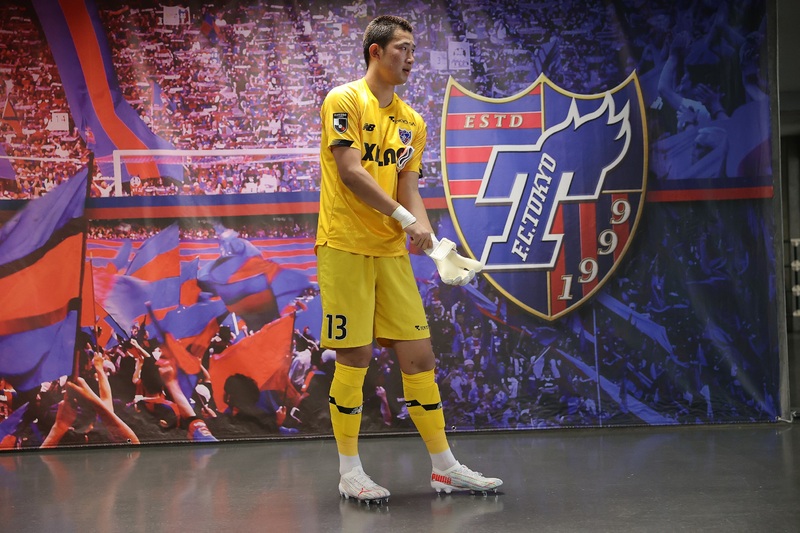
What becomes clear when depicting his half-life is that he possesses a self-actualization ability similar to that of Yuto NAGATOMO. He sets goals and continues to move himself closer to them. It is not an easy task.
During his elementary school days, Go HATANO coexisted with confidence and worries. In the end, the feeling of believing in himself prevailed.
"To be honest, I wasn't very good among my peers. I found the position of goalkeeper and got to play it, and I thought it was fun. That's how it started. When I was in 4th grade, I took the goalkeeper selection for Yokogawa Musashino FC, but during the mini-game, I played on the field. Then I was asked if I could come as a field player instead of a goalkeeper. However, since I applied as a goalkeeper, I wanted to play as one. Around the time I was about to enter 5th grade, I was unsure whether I was suited to be a goalkeeper or not, and I even thought maybe I wasn't cut out for it. But during the period when I was playing as a goalkeeper in matches in the Advanced Class, I was enjoying it. What encouraged me to continue as a goalkeeper despite my doubts was watching goalkeeper plays at a stadium during a Tokyo match, which made me want to improve as a goalkeeper, and gaining confidence by attending various goalkeeper schools. In the end, it was a strong determination to absolutely succeed. When I took the U-15 Musashino selection, I was determined to compete as a goalkeeper."
Coach Akiyama is also impressed by Go HATANO's mentality.
"I have a strong desire to become a professional. It's quite rare. It would be great if there were more kids like him around now. He has a good misunderstanding in a positive way. I think that's one of his unchanging good traits. Even when he confidently says he will definitely become the best in the world and people think, 'Are you okay?' he sticks to it, and I truly believe that's his characteristic."
First, set your goals at the highest point, whether it be becoming the best in the world or like Maradona, and strive to get closer to that. As a result, even when I was a beginner goalkeeper in the fourth grade, I was able to secure a regular position in a top team in Tokyo and express my desire to join the Japan national team.
When I was in elementary school, I dreamed of playing at Ajinomoto Stadium and filling it to capacity. A strong desire to become a professional and to excel in Tokyo always drove him. Now that this dream is coming true, he continues to set high goals.
"Not being selected for the Japan national team means that there is something I am lacking. As a goalkeeper, I feel there is something missing. In order to receive better evaluations, I need to improve more, and I must approach this with a strong desire to improve. I want to continue for another 20 or 30 years, so I want to practice with a strong desire to improve and a strong awareness to deliver even better performances."
One reason we have been able to come this far may be our love for the blue and red.
For one year in the sixth grade and three years in middle school, Go HATANO watched the matches in Tokyo from behind the goal. Now, guarding the goal that lies along that line of sight, he continues to fight, receiving the gaze from the stands where he once stood. Go HATANO spoke about his joy and sense of mission.
"After all, standing in front of the goal means that I am also protecting the fans and supporters of Tokyo. Behind the goalkeeper are the fans and supporters. When the ball goes into our goal, I feel very unpleasant, thinking, 'Oh no, we've conceded a goal.' I want to protect the feelings of the fans and supporters so that doesn't happen, and I will also protect Tokyo's goal. I want everyone to be able to cheer for our matches with smiles and joy, so of course I want to protect the goal, but I also feel the need to protect the smiles of everyone and the feelings of those who come to enjoy the game."
Now I understand why Okazaki praised Go HATANO not for his skills but for his spirit. Whether or not there is spirit will likely change the performance on the pitch, and it will also change how people perceive what is expressed on the pitch.
Go HATANO fought for the team by shouting from the sidelines even when he was not on the field, and the fans and supporters were moved by his presence.
That is certainly the good point and strength of Go HATANO.
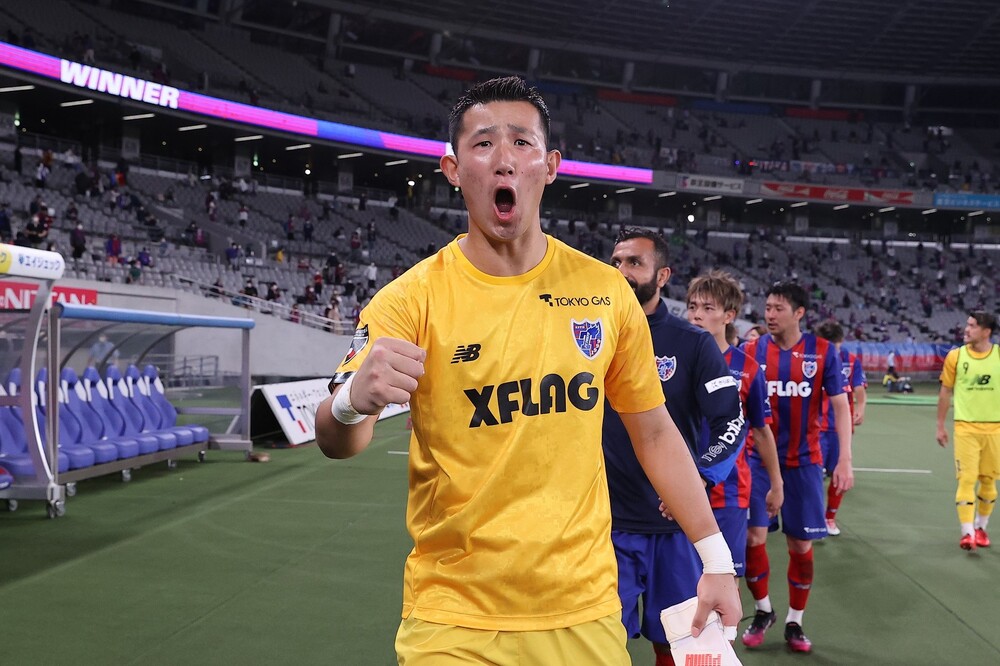
Height/Weight: 198cm/98kg
Place of Origin: Musashimurayama City, Tokyo
Career: FC Tokyo U-15 Musashi → FC Tokyo U-18 → FC Tokyo
Text by Masaru Goto
text by Goto Masaru
Photo by Kenichi Arai
photo by Kenichi Arai
